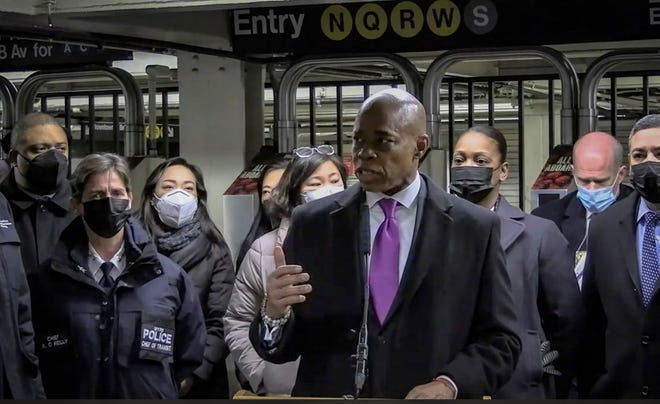
After nearly two years of attacks on Asian Americans, the community is mourning another victim.
On Jan. 16, Michelle Alyssa Go, who was of Asian descent, was pushed to her death in front of a subway train at New York's Times Square station. The man believed responsible fled the scene but turned himself in to transit police a short time later, Police Commissioner Keechant Sewell said at a news conference at the station.
As of now, the tragedy is not considered a hate crime, according to police. Yet the incident still leaves some Asian Americans reeling and once again wondering: Am I next?
Go's death follows a trend of violence against Asians and Asian Americans exacerbated by the pandemic. Stop AAPI Hate, a group that tracks discrimination and xenophobia against Asian Americans and Pacific Islanders, documented more than 10,300 anti-Asian hate incidents from March 19, 2020 to Sept. 30, 2021. In New York alone, the Hate Crime Task Force reported a 233% increase in subway incidents targeting Asians in 2021.

"The pandemic is still continuing, so people are angry and frustrated and still blaming Asians for it," says Russell Jeung, a sociologist and co-founder of Stop AAPI Hate. "People are mourning, clearly upset so they're directing all of that towards Asians. That why we continue to see racism even in 2022: It's the long-term historic racism that has just been unleashed."'
Though much progress has been made by activist groups like Stop AAPI Hate, some are wondering: When will it stop and where is the passion for the Stop Asian Hate movement now?
Original story:Woman dies after being shoved in front of a subway train at Times Square
Michelle Go's death may not be a hate crime. But Asians are still living in fear.
Police officials said Go's killing, including whether it was a hate crime, is still under investigation, but they noted the first woman whom the assailant allegedly approached was not Asian.
Go's death has still had a chilling effect on the AAPI community, which continues to face verbal assault, harassment and even violence. According to Stop AAPI Hate's most recent survey, nearly one in five Asian Americans and Pacific Islanders experienced a hate incident in the past year, despite only making up 7.2% of the U.S. population.
"Not to say everything is racially motivated, but we understand there's a broader context of anti-Asian hate currently," Jeung says, pointing to numerous "random" attacks on Asians including Yao Pan Ma, a 61-year-old man who died on New Year's Eve from injuries during an attack last spring and Vilma Kari, a Filipino immigrant who was brutally kicked by an assailant who allegedly said "You don't belong here."

'Outrageous':New York man hospitalized in critical condition after latest anti-Asian attack
"In that context of racism and fear, any kind of violence against us triggers and reminds us that we’re considered outsiders or threats. So when we see an elder attacked, we think, 'That could've been my mom or grandmother,' and we collectively experience it," Jeung says. "It seems random but it's not in that it could've been any Asian, and that's part of the racial trauma."
Experts say even just witnessing violence can lead to trauma, which can cause a range of debilitating mental and physical health effects. But for Asian women, the trauma is complex as it is often layered with racism, sexism and hyper-sexualization.
"Obviously there are safety issues and members of our community are much more vulnerable, but we have to recognize that Asian women are experiencing harassment and discrimination at disproportionate rates, and it's happening in public places: on the streets, on the sidewalks. It's a serious issue," says Cynthia Choi, co-executive director of Chinese for Affirmative Action and co-founder of Stop AAPI Hate.
Atlanta spa shootings:I'm 'afraid to leave my house': Asian women are living in fear
It's not a moment. It's a movement.
In response to the thousands of hate crimes and incidents across the country, groups like Stop AAPI Hate have been advocating for change – both on a social and political scale.
During its height, there were benefit concerts and rallies spreading the message of Stop AAPI Hate. However, Choi reassures that Stop Asian Hate isn't just a social media trend that is waning in interest: It's a movement.
"These feelings of fear are so real and so valid, and the trauma has been devastating. And yet I wake up every day and I do have hope, because I look back and think about our history and we've overcome so much," she says.
In the last two years, progress has been made: President Joe Biden passed a hate crimes bill into law to address a drastic increase in violence and discrimination directed at Asian Americans; the Stop Asian Hate movement provided a collective voice for Asians to stand up for racial justice; and organizations have attempted to shed light onto the issue including American Girl, who unveiled its first Chinese American "Girl of the Year" earlier this month.
An 'ugly poison':Biden signs bill to combat hate crimes against Asians and Pacific Islanders

"We've overcome legal discrimination, mass violence, discriminatory treatment, and we have resisted, fought back and it's our movement to advance social change," Choi says. "It's a reminder that those who hate depend on us to give up, to feel it's never ending."
Jeung agrees, adding that Stop AAPI Hate will continue to push for more long term, systemic changes.
"We're concerned it's just a moment, but what we want to do is build a movement. That's why promoting education is important: It continues to raise people's consciousness and make them develop racial empathy," he says.
"I'm not so concerned about performative efforts. Stop AAPI Hate is thinking about long term solutions to push policies and make institutional changes."
'A collective trauma':Asian Americans confront mental health crisis amid rise of racist attacks
How to cope with racial trauma
Michi Fu, a professor and licensed psychologist who specializes in cross-cultural and international mental health, said speaking about trauma can be important to cope as it helps someone feel supported and validated.
For those experiencing trauma, Fu suggested:
- Know it's not you. "Racism and discrimination chip away at our inherent sense of worth," she said.
- Make your safety paramount. "If provoked or attacked either online or in person, try your best to take a moment and decide how you want to engage," she said. "Your physical safety and emotional sanity are the most important."
- Join communities. During the pandemic, online communities are a way to connect with "like minded folks for support."
- Process your feelings with trusted friends, family or therapist. "Ideally, someone who understands and empathizes with your experience specifically as it relates to racism and discrimination."
- Do things that bring you joy. This can include "unabashed self-care" or activities like cooking and dancing.
- If you have the energy or capacity, find a purpose. This could be donating to a cause, organizing and advocating.
Want to help?:There's been a rise in anti-Asian attacks. Here's how to be an ally to the community.
Contributing: Sara Moniuszko, USA TODAY
Source link










